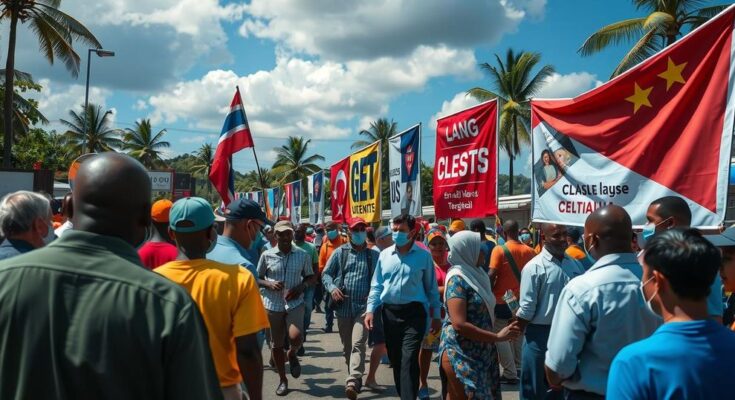Mauritius conducted elections on November 10, 2024, as Prime Minister Pravind Jugnauth’s ruling party seeks a second term in office. Despite recent criticisms, including a controversial social media ban linked to a wiretapping scandal, the nation showcases its stable democratic framework. It is well-regarded for its economic progress and ranks highly on the Human Development Index. Over a million registered voters will determine the party or coalition that will govern for the next five years.
On November 10, 2024, voters in Mauritius participated in elections to select members for a new Parliament, with the ruling party striving to maintain its governance under Prime Minister Pravind Jugnauth. This election marks the twelfth since the nation gained independence from Britain in 1968. Mr. Jugnauth, leading the center-left Militant Socialist Movement, previously secured a majority in 2019 and is presently faced with opposition from Navin Ramgoolam’s Alliance for Change. The electoral process comes amid criticism directed towards Jugnauth’s administration, notably after a brief ban on social media following a significant wiretapping incident that drew public scrutiny. Although the ban was soon rescinded, it sparked worries among opposition factions and civil society. Over 1 million registered voters are poised to elect representatives for 62 parliamentary seats, with the party or coalition that achieves a majority forming the new government. Located approximately 2,000 kilometers off the east coast of Africa, Mauritius boasts a flourishing economy driven by finance, tourism, and agriculture. It is distinguished as one of Africa’s most stable democracies, holding the second position in the Human Development Index across the continent, demonstrating commendable qualities such as life expectancy and education access. Despite the challenges posed by the COVID-19 pandemic, Mauritius has been acknowledged by the World Bank as a “beacon of success for sub-Saharan Africa,” achieving impressive economic progression since independence in 1968. As Mauritius embarks on this electoral journey, the outcome will be pivotal not only for the country but also in the context of demonstrating democratic resilience in the region.
This election occurs as Mauritius works to reaffirm its political stability and economic progress. The nation has gained recognition internationally for its development achievements and democratic governance since achieving autonomy from British rule. A significant recent event influencing the political landscape was the temporary prohibition imposed on social media, which followed a leak of recorded conversations involving influential figures. Such incidents underscore the pressing need for transparency and genuine representation in Mauritian politics. As of now, the island’s vibrant economy, primarily supported by tourism and finance, ranks it highly on global indices assessing human development. This electoral process is particularly critical, determining future administrative directions and the ability of the newly elected government to continue fostering growth and stability.
The ongoing elections in Mauritius reflect a crucial democratic exercise, as citizens evaluate their government’s performance and decide on their preferred leadership for the next term. Prime Minister Pravind Jugnauth seeks to extend his executive mandate amidst recent controversies, while opposition factions aim to challenge the ruling party’s hold on power. The implications of this election extend beyond mere governance, signaling the resilience of Mauritian democracy and its potential path forward in building upon its economic successes and addressing emerging social concerns.
Original Source: apnews.com




